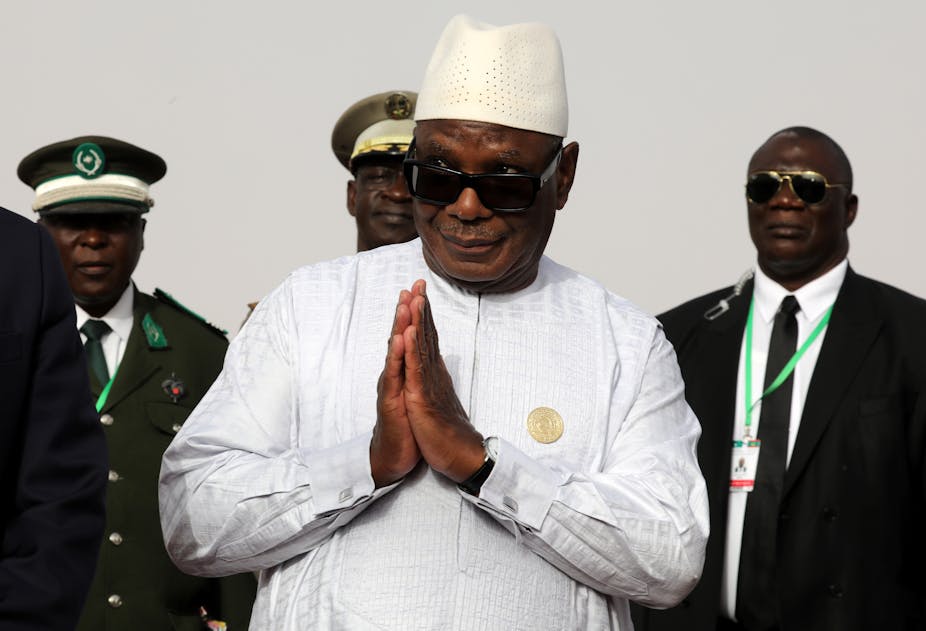Mali scholar and professor of anthropology Bruce Whitehouse has made three predictions about Mali’s upcoming presidential election, with the first round scheduled for July 29, 2018.
Whitehouse predicts low voter turnout, a victory for the incumbent and results that will not make a difference one way or the other. He also hopes that he is wrong. And what if he is? What if Malians’ popular dissatisfaction motivates voters to defeat the incumbent Ibrahim Boubacar Keïta?
What if a change in top leadership catalyses the slow and difficult work to repair state–society relations? What if this election triggers the renewal of the authority and legitimacy of the Malian state?
These “what ifs” should neither encourage unbridled optimism, nor be dismissed out of hand. The current election campaign has happened in complex and deeply troubling conditions.
Yet, Mali’s citizens continue to express their frustrations with status quo governance. The country has been on a 25-year journey to democratisation and the road has been rough. And yet Malians somehow retain their trust in democratic principles. This year in particular they are dissenting loudly.
More frankly and urgently than ever, they are naming the severe shortcomings that afflict their country and expressing their deep desire for genuine alternatives.
As such, this year’s presidential elections should not be dismissed as irrelevant.
Touré’s legacy
Since the 1990s, Mali’s reputation as a “democratic success story” and a “donor darling” rested on a relatively peaceful transition from a military dictatorship (1968-1991) to an electoral democracy in 1992. Mali’s leaders were also seen as diligent implementers of the policy guidance of their international donor partners.
Under former President Amadou Toumani Touré, this reputation mostly fell apart. Between 2002 and 2012, when Touré was in power, Malian public opinion of elected leaders declined significantly. People were deeply dissatisfied with their democracy.
Political institutions and representatives failed to engage with Malians’ core concerns. These concerns included issues around insecurity, poverty, the legal age of marriage and the streamlining of inheritance laws.
The state also abandoned parts of northern Mali. From 2011 to 2012, these parts were then occupied by a fragile and brief alliance of ethnic Tuareg insurgents and socalled Jihadists. Despite sustained international military intervention, the violent conflict spread into central Mali.
Today, Mali faces a “complex, multidimensional security crisis of interlinked micro-conflicts”, which has drawn in state actors, non-state armed groups, and international forces.
Five years after being elected president in 2013 on a tremendous surge of hopeful popular support, Boubacar Keïta has neither met Malians’ high expectations for peace and stability, nor overcome negative aspects of Touré’s legacy. Most glaringly, the incumbent has not effectively led the 2015 Peace Accord process, which handed greater autonomy to the northern region of Mali. More than that, many institutional reforms are yet to be realised in the civil service and armed forces.
Mali’s next president
Chief among Boubacar Keïta’s two dozen challengers is opposition leader and third-time presidential candidate Soumaïla Cissé. His bid may benefit from Mali’s fragmented and highly personalised politics of strategic (if sometimes odd and short-lived) alliances.
Cissé is also banking on support from the broad “anyone but IBK” – a reference to Ibrahim Boubacar Keïta’s initials – movement. He could win in the second-round, if supported by a few top-tier first-round candidates.
But another factor, evident only in the past week or so, is a higher voter turnout than was previously anticipated. As of July 17 official figures show that over 62.26% of Mali’s eight million voters have collected their voters cards. While a high turnout doesn’t necessarily favour Cissé over Boubacar Keïta, it could weaken the incumbent’s chances at the ballot box.
In addition to feeding anti-incumbent sentiment, Cissé is presenting his experience in past governments as a key credential. This experience, however, is double-edged because he is also claiming that his presidency will present a decisive break with the past. This is despite the fact that he is still part of the political class that has been roundly criticised for its failures and excesses.
Ironically, Youssouf “Ras Bas” Bathily, one of the most vocal and ardent critics of the Malian political establishment, is now among Cissé’s main supporters. Ras Bas is the leader of the citizen movement dubbed the Collective for the Defence of the Republic.
Who can Malians trust?
Whoever wins the upcoming election will have to contend with widespread distrust among Malians in the State’s institutions. A foremost complaint among the people is the blatant disregard for human rights by state and non-state actors.
This disregard has its roots in the systemic flaws in Mali’s politics and institutions. These flaws need to be corrected as a matter of urgency. Some have argued that this can only be done through a complete transformation of the ideas and practices at the core of the state. Through this transformation, Mali’s social contract will be renewed and the relations between the state and society restored.
These are profound challenges indeed for Mali’s next president.
Like never before in their country’s democratic era, Malians want their next president to hear their frustrations and to make the changes necessary for durable peace and sustainable livelihoods. Voters will ensure that whomever is elected understands in no uncertain terms that past practices cannot hold. And while Mali’s present and future is fraught with difficulty, there is also a real possibility for change.

